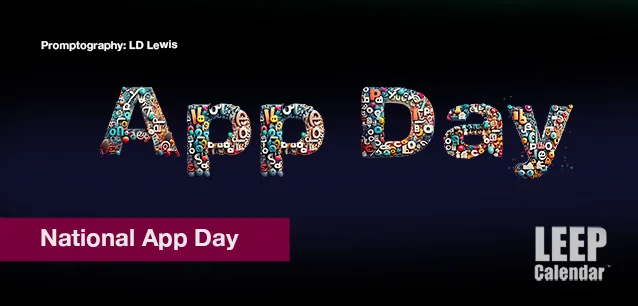 AD
AD
Today is: December 10
Scroll to explore events active on this date.
LEEP INK FEATURES

August? Absolutely!
In August, we live through the Dog Days of Summer. It's hot and often humid, and those who can leave for better climates do. Down south, winter is in full force. August is also known as "the ...

In The Heat of July: July 2025 Events
Is it hot enough (or cold enough if you're below the equator) for you yet? There is actually a day for that! Like every month, I pick a diverse collection of events you may or may not know about. This ...

May Blooms: Events in May 2025
Along with October, May is one of the most densely packed months of the year. It's before the summer humidity and the last whole month of the school year. The weather is warming in t...
About National App Day
Education , Hobby
Lifestyle , United States
Ends: Dec 11, 2024
DESCRIPTION:
National App Day celebrates the programs, software, and plug-ins that make our lives easier.
The history of apps, short for applications, aligns with the evolution of computing and mobile technology. The concept of an "app" has transformed significantly, from simple software programs on early computers to the sophisticated mobile applications we use today.
The first recognizable apps were software programs designed for the earliest computers in the 1950s and 1960s. Computer scientists tailored these applications for specific tasks such as calculations, data processing, and word processing.
However, the modern concept of an app as we know it today — specialized software downloaded on a device — took shape with the advent of personal computers in the 1970s and 1980s. Software applications for these computers, like Microsoft Word or Excel, could be considered early versions of apps.
The true revolution in apps came with the rise of the internet and the development of web applications in the 1990s. These web apps allowed users to interact with software through a web browser, making them more accessible and user-friendly.
The app landscape underwent another major transformation with the introduction of smartphones. The real turning point was in 2008 with the launch of Apple's App Store for the iPhone. This platform allowed third-party developers to create and distribute applications designed for the iPhone's interface and operating system. Other platforms like Android rapidly adopted The App Store model, leading to the explosive growth of mobile apps.
As for the first app, it's challenging to pinpoint a single "first" app due to the evolution of the concept over different technological eras. In the context of mobile apps, one of the first applications introduced on the Apple App Store was "Snake," a game app. However, several other simple apps like a calculator, calendar, and email were embedded on platforms in earlier smartphones.
The creation and proliferation of apps have been a collective effort by countless developers, companies, and innovators worldwide. This collaborative development has led to an app ecosystem that spans millions of applications, serving a myriad of functions from entertainment and communication to health, education, and business.
The history of apps is a story of technological advancement and adaptation, reflecting the changing ways in which people interact with technology in their daily lives. From rudimentary software on the earliest computers to the dynamic and diverse applications available at our fingertips today, apps have become an integral part of the digital experience. This day originated in 2022.
VIDEOS
SUPPORTING DOCUMENTS
Currently, this event does not have supporting documents.
ADDITIONAL IMAGES
Currently, this event does not have supporting images.
Where would you like to go now?
 AD
AD


/footer-logo.svg)
